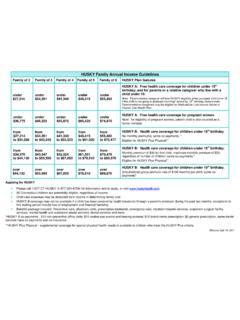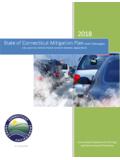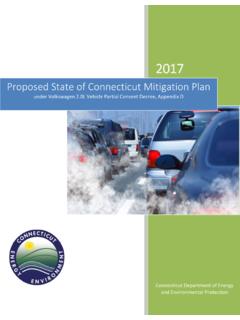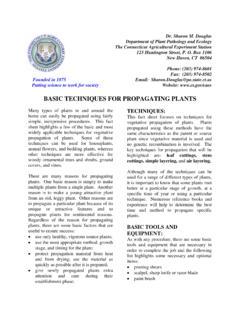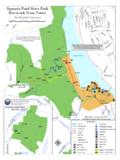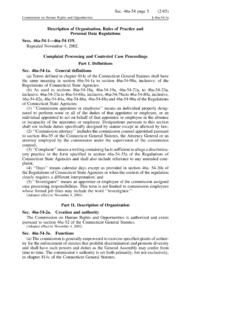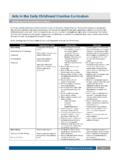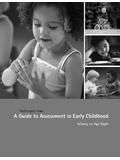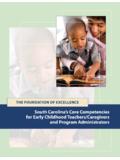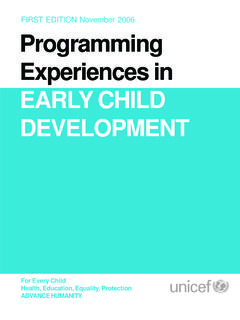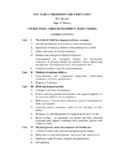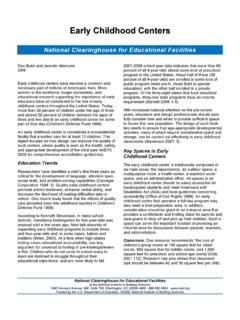Transcription of Connecticut Office of Early Childhood Maternal, Infant ...
1 Connecticut Office of Early Childhood Maternal, Infant , and Early Childhood Home Visiting Outcomes Rate Card Pilot FACT SHEET PROJECT OVERVIEW In Early 2018, the Connecticut Office of Early Childhood (OEC) launched a year-long outcomes rate card pilot with Social Finance. An outcomes rate card is a procurement tool through which government defines a menu of outcomes it wishes to purchase and the amount it is willing to pay each time a given outcome is achieved. OEC is incorporating bonus payments into existing service providers 2018 contracts for achievement of the following outcomes: Full-Term Birth Caregiver Employment Safe Children Family Stability With the OEC outcomes rate card pilot, OEC continues its progress toward performance orientation for multi-generational services and encourages providers to focus on achieving meaningful outcomes.
2 PROJECT BACKGROUND A network of 22 providers deliver home-visiting services to 1,300 at-risk families living in Connecticut each year through the federally-funded Maternal, Infant , and Early Childhood Home Visiting program (MIECHV). This includes the Parents as Teachers (PAT), Early Head Start (EHS), Nurse Family Partnership (NFP) and Child First programs. The outcomes rate card allows providers to take a family-centric approach that tailors services to the needs of individual parents and children. The provider receives a bonus payment for each positive outcome achieved per family, as defined though the outcomes rate card. PAT, EHS and NFP primarily serve pregnant mothers and caregivers with children under the age of two; Child First primarily serves families whose children are slightly older, and a portion of its clients are already involved with the state s Department of Children and Families.
3 The outcomes rate card offers a new opportunity for all of Connecticut s MIECHV service providers: a total of up to $250,000 is available to service providers for outcomes-based bonus payments. The outcome payments will draw from the OEC MIECHV budget as well as support from Early Childhood Investments at the Harford Foundation for Public Giving, which has committed up to $34,000 for bonus payments to Hartford-based service providers. The additive, outcome-based bonus payments will serve as a quality improvement mechanism for providers shifting their attention to key, near-term outcomes. The contracts also continues to provide full funding to cover current program activities. Bonus payments to providers are dependent upon the achievement of the defined outcomes. OEC and Social Finance selected outcomes that generate value to families, communities, and government; are measureable and can be linked to administrative data systems; and focus on two-generational impacts.
4 An enrolled family successfully achieves the following outcomes when: Full-Term Birth: For families enrolled prenatally before 28 weeks gestation, the child is born at 37 weeks gestation or later. Safe Children: At the time of measurement,* there are no substantiated cases of maltreatment (other than any reported by provider staff) and no incidents of injury- or ingestion-related visits to the emergency room. * The time of measurement for each outcome depends on the provider model, as defined in each service provider contract. Caregiver Employment: At the time of measurement,* the caregiver is employed, enrolled in education or training, or has recently graduated from an education or training program. Family Stability: For families that are identified at intake to have a demonstrated need for child care, health care, or housing, the need is met by the measurement point.
5 * Outcomes and outcome prices reflect family risk levels. Each outcome includes two risk levels in order to incentivize enrolling harder-to-serve families. Historical MIECHV data helped Social Finance and OEC identify baseline incidence rates for each outcome and the expected distribution of families across risk levels. The pilot includes all families served and enrolled in 2018. Based on the results, OEC will look to adjust and continue the program in future years. Outcomes rate cards were pioneered in the United Kingdom, where the national government launched multiple rate card funds addressing youth employment, homelessness, and foster care. Social Finance has spearheaded the approach in the United States, and is currently working with multiple local and state governments and nonprofits to innovate on the traditional Pay for Success approach.
6 By developing outcomes rate cards, Social Finance and its partners will help procurement systems become more performance-based, and launch outcome-contingent contracts at scale. PROJECT PARTNERS About the Office of Early Childhood The Connecticut Office of Early Childhood advances a family-centered approach to support young children and families. Integrating Early Childhood programming formerly administered by five separate state agencies, OEC serves children each year through programs including child care, pre-K, home visiting, health and safety assurance, Early intervention and parenting supports. Through this integrated approach and through collaborations with other state agencies, OEC works to advance better coordinated, more cost-effective services that yield measurable results for Connecticut s children and families. To contact the Office of Early Childhood , visit or call (860) 500-4412.
7 About Social Finance Social Finance is a 501(c)(3) nonprofit organization dedicated to mobilizing capital to drive social progress. Social Finance is committed to using Pay for Success to tackle complex social challenges, facilitate greater access to services for vulnerable populations, and direct capital to evidence-based social programs all with the goal of measurably improving the lives of people most in need. Social Finance has deep experience in the design and implementation of Pay for Success projects, from Early -stage feasibility assessment, to project development and capital formation, to post-launch performance management and investment support. Our sister organization, Social Finance UK, launched the world s first Social Impact Bond in 2010. For more information and to learn how to support our work, visit The technical assistance provided by Social Finance to develop this project is funded through a Fiscal Year 2016 award from the federal Social Innovation Fund of the Corporation for National and Community Service.
8

